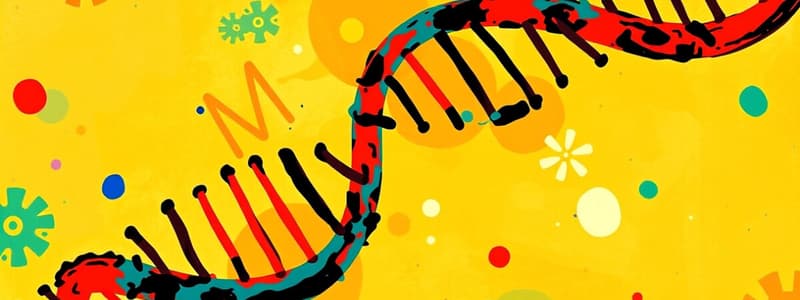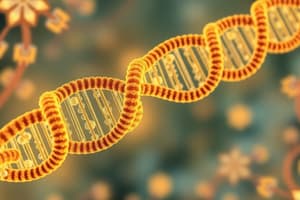Podcast
Questions and Answers
RNA can leave the:
RNA can leave the:
- Cytoplasm
- Ribosome
- Nucleus (correct)
- Mitochondria
MRNA is made during:
MRNA is made during:
- Cell Division
- Translation
- Replication
- Transcription (correct)
MRNA is made in the:
MRNA is made in the:
- Cytoplasm
- Golgi Apparatus
- Endoplasmic Reticulum
- Nucleus (correct)
DNA is located in the:
DNA is located in the:
Which process converts DNA to mRNA?
Which process converts DNA to mRNA?
MRNA is used to carry the genetic code from DNA to:
MRNA is used to carry the genetic code from DNA to:
Which type of RNA makes up the ribosome?
Which type of RNA makes up the ribosome?
RNA uses what instead of thymine?
RNA uses what instead of thymine?
What makes up a protein?
What makes up a protein?
Transcription takes place in the:
Transcription takes place in the:
TRNA is used in:
TRNA is used in:
TRNA uses what to match to the mRNA?
TRNA uses what to match to the mRNA?
Proteins are made at the:
Proteins are made at the:
TRNA attaches the amino acids into a:
TRNA attaches the amino acids into a:
TRNA is found in the:
TRNA is found in the:
Translation takes place in the:
Translation takes place in the:
Which process converts mRNA into a protein?
Which process converts mRNA into a protein?
Flashcards are hidden until you start studying
Study Notes
Key Concepts in Molecular Biology
- RNA can exit the nucleus, while DNA remains confined.
- Transcription is the process in which mRNA is synthesized from DNA.
- mRNA is produced in the nucleus before moving to the cytoplasm for translation.
- DNA is stored exclusively within the nucleus of the cell.
Transcription and Translation Processes
- Transcription converts the DNA code into mRNA, which then directs protein synthesis.
- mRNA is responsible for conveying genetic information from DNA to ribosomes, where proteins are synthesized.
- Translation occurs in the cytoplasm, utilizing mRNA to assemble proteins.
Types of RNA
- mRNA carries the genetic blueprint for protein assembly, while rRNA is a key structural component of ribosomes.
- RNA employs uracil in place of thymine, which is found in DNA.
- Amino acids, the building blocks of proteins, are linked by RNA during translation.
Role of tRNA
- tRNA brings amino acids to the ribosome, facilitating protein synthesis by matching its anticodons to mRNA codons.
- The process of translation is crucial for converting mRNA sequences into functional proteins.
Location and Function
- Transcription occurs within the nucleus, and translation is executed in the cytoplasm, highlighting the compartmentalized nature of cellular processes.
- Proteins are synthesized at ribosomes, the site of translation, which play a vital role in gene expression.
Studying That Suits You
Use AI to generate personalized quizzes and flashcards to suit your learning preferences.




